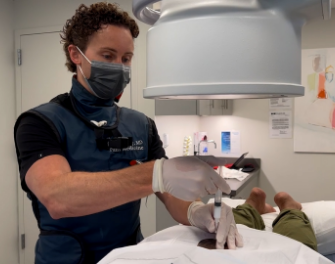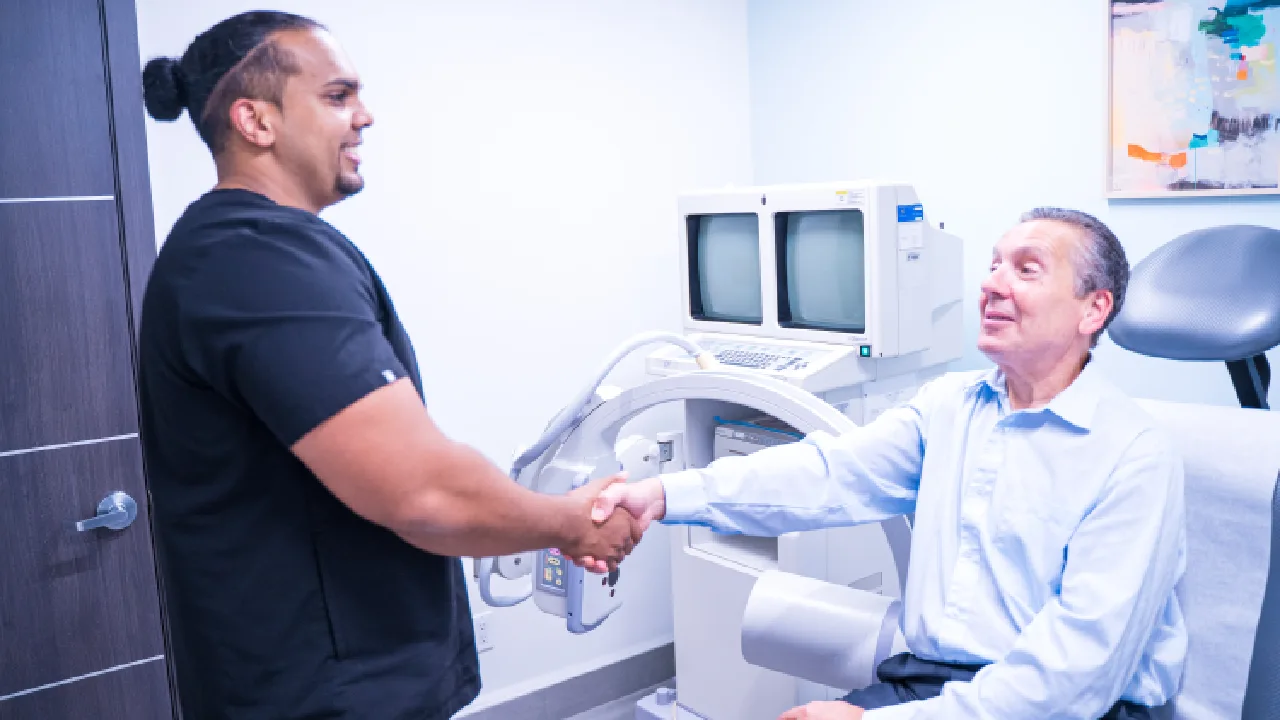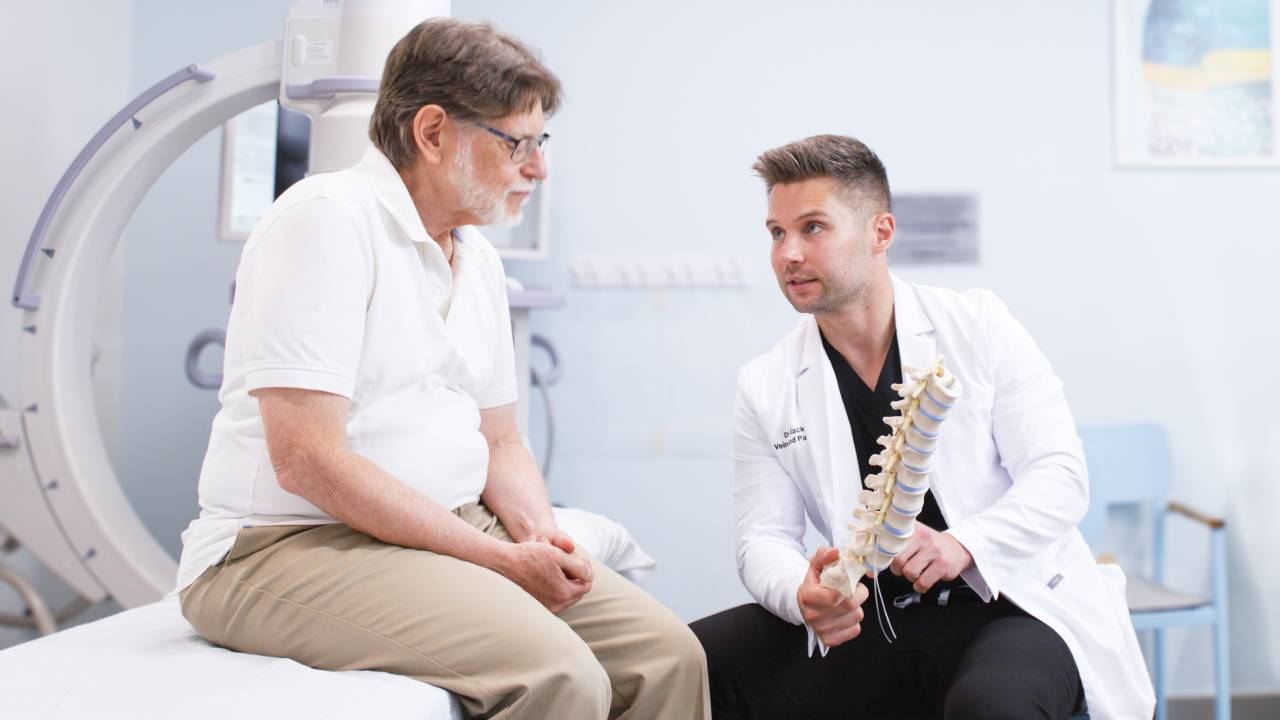
When Chronic Pain Becomes Too Much: Understanding, Managing, and Treating Chronic Pain
Chronic pain is more than just discomfort; it can significantly impact your quality of life, making even simple daily tasks seem daunting. At Pain Treatment Specialists, we understand the debilitating effects of chronic pain and are dedicated to providing effective, minimally invasive treatments to help you regain control of your life. In this guide, we’ll delve into what chronic pain is, when it becomes too much to handle, and how you can find relief.
Are you interested in get more information about your condition or get a treatment?
Fill the form below to start!
Chronic Pain, Defined
Chronic pain is characterized by persistent discomfort that lasts weeks, months, or even years. Unlike acute pain, which typically serves as a warning sign of injury or illness and resolves once the underlying cause is treated, chronic pain persists long after the initial injury has healed. It can manifest in various forms, such as sharp, shooting pain, dull aches, or burning sensations, and it can affect any part of the body.
Types of Chronic Pain:
- Neuropathic Pain: Caused by damage or dysfunction of the nervous system, resulting in shooting or burning sensations.
- Musculoskeletal Pain: Arises from injuries or conditions affecting the muscles, bones, joints, or connective tissues, leading to stiffness, aching, or throbbing sensations.
- Inflammatory Pain: Results from inflammation in the body, contributing to swelling, redness, and discomfort.
- Central Sensitization: Occurs when the nervous system becomes hypersensitive, amplifying pain signals and causing heightened pain perception.
When Chronic Pain Becomes Unmanageable
Living with chronic pain can be exhausting, both physically and emotionally. While some are able to cope with their symptoms using conservative measures such as over-the-counter pain relievers or lifestyle modifications, others may find that their pain becomes increasingly unbearable despite these efforts. So, when does chronic pain become too much to handle?
Warning Signs:
- Inability to Perform Daily Activities: When chronic pain interferes with your ability to carry out routine tasks such as getting out of bed, showering, or cooking meals, it may be a sign that your pain is becoming unmanageable.
- Sleep Disturbances: Persistent pain can disrupt sleep patterns, leading to insomnia or frequent awakenings throughout the night. This lack of restorative sleep can exacerbate pain and further impact overall well-being.
- Mood Changes: Chronic pain often takes a toll on your mental health, contributing to feelings of anxiety, depression, irritability, or hopelessness. If you find yourself struggling to cope emotionally, it’s essential to seek support from a healthcare professional.
- Decreased Quality of Life: When pain limits your ability to participate in activities you enjoy or spend time with loved ones, it can diminish your overall quality of life and leave you feeling isolated or withdrawn. This is a sign that you need to contact a pain specialist.
Seeking Help for Chronic Pain
If you’re experiencing severe or persistent pain that affects your daily life, it’s crucial to seek medical attention. While emergency rooms can provide immediate relief for acute injuries or conditions, they are not equipped to manage chronic pain. Instead, schedule an appointment with a pain specialist who can offer personalized treatment options tailored to your needs.
Why Choose Pain Treatment Specialists?
- Minimally Invasive Treatments: At Pain Treatment Specialists, we specialize in minimally invasive procedures that target the source of your pain without opioids or surgery. Our approach focuses on achieving long-term relief while minimizing discomfort and downtime.
- Board-Certified Experts: Our team of interventional pain doctors is board-certified and highly experienced in diagnosing and treating a wide range of chronic pain conditions. We use advanced techniques to deliver superior care and outcomes for our patients.
- Comprehensive Evaluation: Before recommending any treatment, we conduct a thorough evaluation to understand the root cause of your pain fully. By identifying contributing factors such as underlying medical conditions, lifestyle habits, or previous injuries, we can develop a targeted treatment plan that addresses your unique needs.
- Insurance Verification: We offer insurance verification to help streamline the appointment process and ensure that you have access to the care you need. Our team works closely with insurance providers to verify coverage and minimize out-of-pocket expenses for our patients.
Effective Treatment Options for Chronic Pain
There is no one-size-fits-all approach to managing chronic pain. Depending on the underlying cause and severity of your symptoms, we may recommend a combination of treatments to help alleviate your pain and improve your quality of life.
Minimally Invasive Procedures:
- Epidural Steroid Injections: By delivering anti-inflammatory medication directly to the affected area, epidural steroid injections can reduce pain and inflammation associated with conditions such as herniated discs or spinal stenosis.
- Facet Joint Injections: These injections target the small joints located along the spine, providing relief from pain caused by arthritis, injury, or mechanical stress.
- Radiofrequency Ablation: This procedure uses heat energy to disrupt the function of pain-transmitting nerves, offering long-lasting relief for chronic back, neck, or joint pain.
Physical Therapy:
- Exercise Programs: A tailored exercise program can help improve strength, flexibility, and mobility while reducing pain and preventing future injuries.
- Manual Therapy: Techniques such as massage, manipulation, or stretching can alleviate muscle tension, improve circulation, and promote healing.
Medication Management:
- Nonsteroidal Anti-Inflammatory Drugs (NSAIDs): These medications help reduce pain and inflammation, making them suitable for conditions such as arthritis, tendonitis, or bursitis.
- Neuropathic Medications: Certain drugs can help alleviate nerve-related pain by modulating abnormal pain signals in the nervous system.
Chronic Pain FAQs
What causes chronic pain?
Chronic pain can arise from various sources, including injuries, underlying medical conditions, nerve damage, inflammation, or musculoskeletal disorders. Factors such as genetics, lifestyle habits, and past injuries can also contribute to the development of chronic pain.
When should I seek medical help for chronic pain?
It’s essential to seek medical attention if you’re experiencing severe or persistent pain that interferes with your daily activities, affects your quality of life, or fails to improve with conservative treatments. Our team can evaluate your symptoms, identify the underlying cause, and recommend appropriate treatment options to alleviate your pain.
What types of treatments are available for chronic pain?
At Pain Treatment Specialists, we offer a range of minimally invasive procedures, physical therapy modalities, and medication management to help manage chronic pain. These may include epidural steroid injections, facet joint injections, radiofrequency ablation, exercise programs, manual therapy, and nonsteroidal anti-inflammatory drugs (NSAIDs).
How do I know which treatment is right for me?
Determining the most appropriate treatment for your chronic pain depends on various factors, including the underlying cause of your symptoms, the severity of your pain, your medical history, and your treatment preferences. During your consultation, our board-certified specialists will conduct an evaluation to assess your condition and develop a personalized treatment plan.
Are your treatments covered by insurance?
Yes, we work with most major insurance providers to ensure that our treatments are accessible and affordable for our patients. Before your first appointment, we offer hassle-free insurance verification to determine your coverage and minimize any out-of-pocket expenses. Our team will assist you in navigating insurance and addressing any concerns you may have about payment or billing.
Are your procedures painful?
Our minimally invasive procedures reduce discomfort and promote a quick recovery. While you may experience some mild discomfort or soreness at the injection site, most patients tolerate the procedures well and report significant pain relief afterward. Our team prioritizes patient comfort and safety throughout the treatment, and we utilize advanced techniques and anesthesia options to ensure a positive experience.
How long does it take to experience relief from chronic pain treatments?
The timing of pain relief can vary depending on the type of treatment, the underlying cause of your pain, and your individual response to therapy. Some patients experience immediate relief following a procedure, while others may notice gradual improvement over several days or weeks as the effects of the treatment take full effect. Our team will provide guidance on what to expect during the recovery process and offer ongoing support to monitor your progress.
Can chronic pain be cured?
While chronic pain may not always be curable in the traditional sense, it can often be effectively managed with the right combination of treatments and lifestyle modifications. Our goal is to reduce your pain, improve your function, and enhance your overall quality of life so that you can resume your daily activities and enjoy meaningful experiences without being limited by pain.
What can I do to prevent chronic pain from worsening?
In addition to seeking professional treatment, there are several steps you can take to manage and prevent chronic pain from worsening. These may include maintaining a healthy weight, staying physically active, practicing good posture and ergonomics, managing stress, getting adequate rest and sleep, and avoiding activities or behaviors that exacerbate your symptoms. Our team can provide personalized recommendations to help you adopt healthy habits and reduce your risk of recurrent or worsening pain.
How do I schedule a consultation with Pain Treatment Specialists?
Scheduling a consultation with us is easy! Simply contact our office by phone or through our website to request an appointment. Our friendly staff will assist you in selecting a convenient time and location for your visit and answer any additional questions you may have about our services or the consultation process. We look forward to helping you find relief from chronic pain and improve your overall quality of life.
Schedule Your Consultation for Chronic Pain
Chronic pain can have a profound impact on every aspect of your life, but you don’t have to suffer in silence. At Pain Treatment Specialists, we offer comprehensive, compassionate care to help you find relief from your symptoms and reclaim your quality of life. Whether you’re dealing with back pain, joint pain, neuropathy, or another chronic condition, our board-certified experts are here to support you every step of the way. Schedule a consultation with us today.
FEATURED POSTS BY PAIN DOCTORS



















